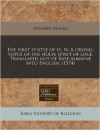3
Followers
24
Following
Cogitatio
Reflections on philosophy, theology and just observations on life.
Currently reading
The first epistle of H. N. A crying-voyce of the holye spirit of loue. Translated out of Base-almayne into English. (1574)
The Works of James Arminius, Volume 1
Politics, Law, and Morality: Essays by V.S. Soloviev
Meditations on the Soul: Selected Letters
The Complete Poetry and Prose
The Encyclopedia of Philosophy (8 Volumes in 4)
Cambridge Platonist Spirituality
Wellsprings of Faith: The Imitation of Christ; The Dark Night of the Soul; The Interior Castle
Paul and the Stoics
Locke: Two Treatises of Government (Cambridge Texts in the History of Political Thought)
Peter Sterry: Platonist and Puritan 1613 1672
 I like Peter Sterry quite a bit. His thought is both mystical and fairly dense in complexity. I came across him while studying the Cambridge Platonists. They were a group of instructors affiliated with Cambridge college during the period of the English commonwealth. Most of them were called latitudinarians because they supported less restrictions on matters of faith and conscience. They were often strongly Protestant in theology but also Platonist and Neoplatonist in philosophy. Their ideas are interesting, but so far I have been the most impressed with Sterry. His discourse is more than cursorily poetic. His mystical tendencies are very hard to separate from his theological and philosophical tendencies, although some compilers have attempted to do just that. This compilation is more honest than the McMahon treatment in that regard. Sterry really made it clear to me that not all Puritans were cut from the same cloth. The introduction includes a great biography of Sterry and a breakdown of his theology. This is really a great introduction to the man and his thought, but his works need to be read as a whole, not just as brief extracts. This really only provides a glimpse into his brilliance.
I like Peter Sterry quite a bit. His thought is both mystical and fairly dense in complexity. I came across him while studying the Cambridge Platonists. They were a group of instructors affiliated with Cambridge college during the period of the English commonwealth. Most of them were called latitudinarians because they supported less restrictions on matters of faith and conscience. They were often strongly Protestant in theology but also Platonist and Neoplatonist in philosophy. Their ideas are interesting, but so far I have been the most impressed with Sterry. His discourse is more than cursorily poetic. His mystical tendencies are very hard to separate from his theological and philosophical tendencies, although some compilers have attempted to do just that. This compilation is more honest than the McMahon treatment in that regard. Sterry really made it clear to me that not all Puritans were cut from the same cloth. The introduction includes a great biography of Sterry and a breakdown of his theology. This is really a great introduction to the man and his thought, but his works need to be read as a whole, not just as brief extracts. This really only provides a glimpse into his brilliance.













